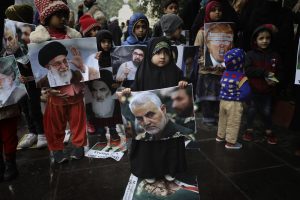The action-reaction cycle of escalation between the United States and Iran took a dramatic turn on January 8 as Iran’s Islamic Revolutionary Guard Corps launched several ballistic missiles at US military facilities in Iraq.
The attack, codenamed Operation Martyr Soleimani, was designed by the Iranian side to avenge the killing of Qassem Soleimani, the late leader of the IRGC’s Quds Force, who was responsible for managing Tehran’s proxy and regional activities in the Middle East.
The current round of escalation can be traced back to the final days of 2019, when the United States reacted disproportionately to an attack that killed a U.S. contractor by the Iran-aligned Kataib Hezbollah militia in Iraq.
But even going further back, the events of the last two weeks can be traced back to the gradual heightening of tensions between Washington and Tehran since the May 2018 decision by the Trump administration to place the United States in violation of its commitments under the 2015 Joint Comprehensive Plan of Action and the American decision to reimpose sanctions on Iran.
As the Trump administration enters what might be its final year in office, the spiraling crisis with Iran underscores the consequences of the lack of effective bureaucratic guardrails on the president’s impulses.
Until Donald Trump’s presidency, scholars of international relations might have been skeptical that such a thing as “diversionary” war can really exist, but Trump has apparently shown this not to be the case.
After becoming the third-ever president to be impeached in the House of Representatives, Trump has now thrown a lit match on the US-Iran relations tinderbox.
According to U.S. political reporting, the president had apparently also told his associates that he hoped the strike on Soleimani would help his impending impeachment trial in the Senate, apparently seeking to win favor with senators who are hawkish on Iran.
The current round of nonsensical escalation with Iran is deeply counterproductive to broader U.S. interests and even goes against many of this administration’s stated global priorities.
It is no surprise that Trump gives little heed to his own administration’s strategic documents, all of which he has likely never read or even perhaps heard of, but the first days of 2020 underscore that if “great power competition” is meant to be this administration’s strategic mantra, it is not guiding Trump’s decision-making in any real way.
For China, the prospect of a new American quagmire in the Middle East by way of a potential war in Iran presents both a troubling prospect and an intriguing opportunity.
Beijing’s most apparent interests – including stability in hydrocarbon prices and supply from the Persian Gulf — would be negatively affected by a war, of course.
But over the longer term, a US-Iran conflict would be devastating to the United States’ ability to sustain power projection in the Asia-Pacific theater.
It would also put an end to the U.S. Department of Defense’s exhortation in last year’s Indo-Pacific Strategy Report that the Asian region was the Trump administration’s “priority theater”.
The current US-Iran crisis might also give Beijing an opportunity to step up its appearance of global leadership. Traditionally, China has kept a low profile internationally during major crises, but increasingly, Beijing is speaking out – often by partnering with Russia over shared interests.
For instance, after the U.S. embassy in Baghdad was besieged by Kataib Hezbollah supporters in the final days of 2019, the Chinese and Russian permanent representatives at the United Nations were unwilling to assent to a U.S. statement condemning the siege. Beijing and Moscow saw the statement as excluding U.S. culpability for the Soleimani strike.
Depending on how the crisis may evolve, Beijing might find itself forced to take on greater responsibility. China’s relationship with Iran is complex, but Beijing hardly sees Tehran’s ability to act on its own preferences in the Middle East as relevant to its interests.
But allowing the United States to distract itself with yet another misadventure in the Middle East may prove tempting.
Following Iran’s missile strikes, the United States has not chosen to respond for now. If good sense and reason somehow prevail against all odds, then the crisis might end here and Washington and Tehran might somehow find a way to not only deescalate, but to perhaps even begin to address their differences on either side of a negotiating table.
A version of this article first appeared at the South China Morning Post. It is republished here with kind permission.

































